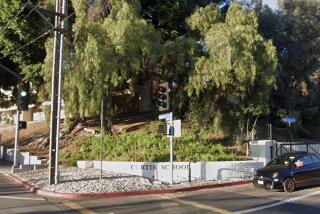Teens Cheated in O.C. Class, Using E-Mail
- Share via
About a dozen Sunny Hills High School honors students have been disciplined for using e-mail to share information on a history final, providing a vivid example of how computer technology is making it easier to cheat in school.
The cheating, which arose during finals week in January, was initiated by at least one 10th-grade student at the Fullerton school who had taken the test and e-mailed its questions and a set of answers to fellow students who would take the test on following days. The final exam was for an honors course in Geography/History of Non-Western Culture, Principal Loring Davies said Monday.
“[Cheating] is something that has occurred probably as long as there have been schools,” Davies said. “But now that students have a new medium at their disposal, we need to educate kids on what is appropriate and not appropriate use of the Internet.”
While Davies declined to discuss details to protect student confidentiality, one school district administrator said about a dozen students were involved.
Cheating is common in high schools, according to a recent study by the Josephson Institute of Ethics, based in Marina del Rey. In the 1998 report, for which 20,000 students were surveyed, seven of 10 high-schoolers admitted to cheating on a test at least once. Sunny Hills is recovering from a 1997 cheating incident in which 13 students were kicked out of the National Honor Society for sharing notes and research on an honors philosophy class assignment.
Even more, some ethicists added, computers and the Internet are swelling a tide of cheating and plagiarism in schools and colleges. The latest high-tech fad educators are battling is the proliferation of term papers being sold and posted on the Internet.
“I don’t think there’s any question that the Internet will increase the amount of cheating to some degree,” said Donald McCabe, a Rutgers University professor who has studied cheating in high school and college. “What concerns me is these new methods make it so easy to cheat. It allows students to exchange a great volume of information.”
Because of the wealth of information available to students at the press of a button, McCabe cautioned teachers to design different versions of their tests to prevent cheating.
In the Sunny Hills case, the exam was scheduled to be given to students in shifts over a few days, depending on which academic period they took the class. Many high schools schedule finals this way to avoid having students face an exhausting number of tests in one day.
The incident apparently took place Jan. 27 when a student who took the test early in the week copied down questions and included answers in a mass e-mail sent to other students who had not taken the final. Two days later, a couple of students reported it to social studies teacher Patrick DeBacker. School administrators investigated and were able to determine which students viewed the e-mail before taking the test.
In the past few years, some Orange County schools, including Sunny Hills High, have stiffened their academic policies to prevent cheating on campus. Davies, the Sunny Hills principal, said administrators applied the school’s policies in punishing the students. He would not say how the students were disciplined.
*
According to the school’s policy, students caught cheating for the first time may get a failing grade on the test or assignment or be placed on academic probation. For a second infraction, students will be removed from the course with a failing grade and no credits, disqualified from academic honors organizations, and the incident will be noted on academic records.
Students at the top-ranked high school, which offers an academically challenging International Baccalaureate program, bemoaned the latest stain on its reputation, saying cheating occurs to the same extent at other high schools.
Indeed, one of the county’s most notorious cheating scandals occurred in 1994 when an independent auditor found that Brea-Olinda High School teachers had illegally tampered with students’ grades on 607 occasions. And last academic year, two Brea-Olinda High School government leaders were suspended from their elected posts after they were found guilty of cheating on a honors physics test. In a separate case the same year, the school valedictorian entered his English teacher’s computer files and changed his grade from a B to an A.
Stephen Davis, a Kansas professor who has researched student cheating, said it can be prevented by having schools include students in establishing and enforcing academic honor codes.
“If students have a hand in creating and helping in enforcing the honor code, then an honor code does work,” said Davis, a psychology professor at Emporia State University. “If they are told they must abide by strict rules, then it will fail.”
More to Read
Sign up for Essential California
The most important California stories and recommendations in your inbox every morning.
You may occasionally receive promotional content from the Los Angeles Times.













